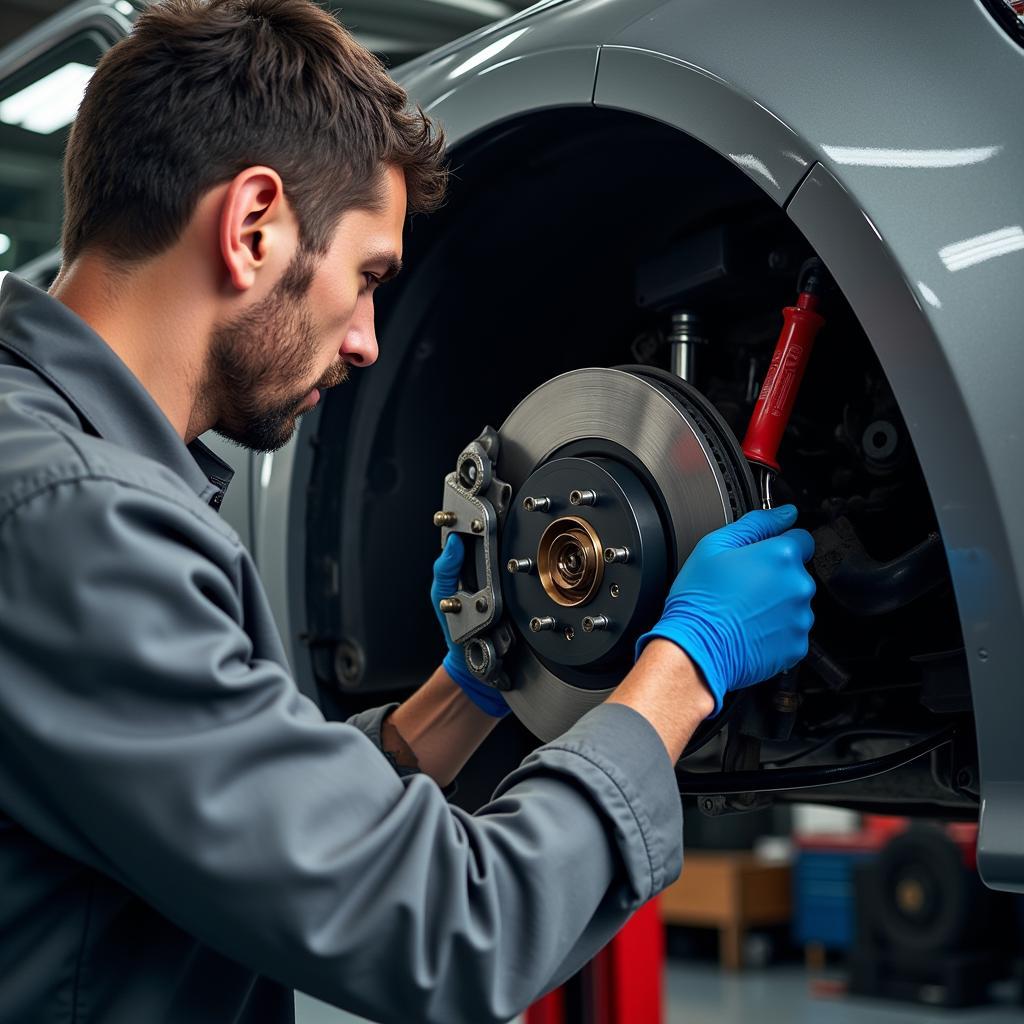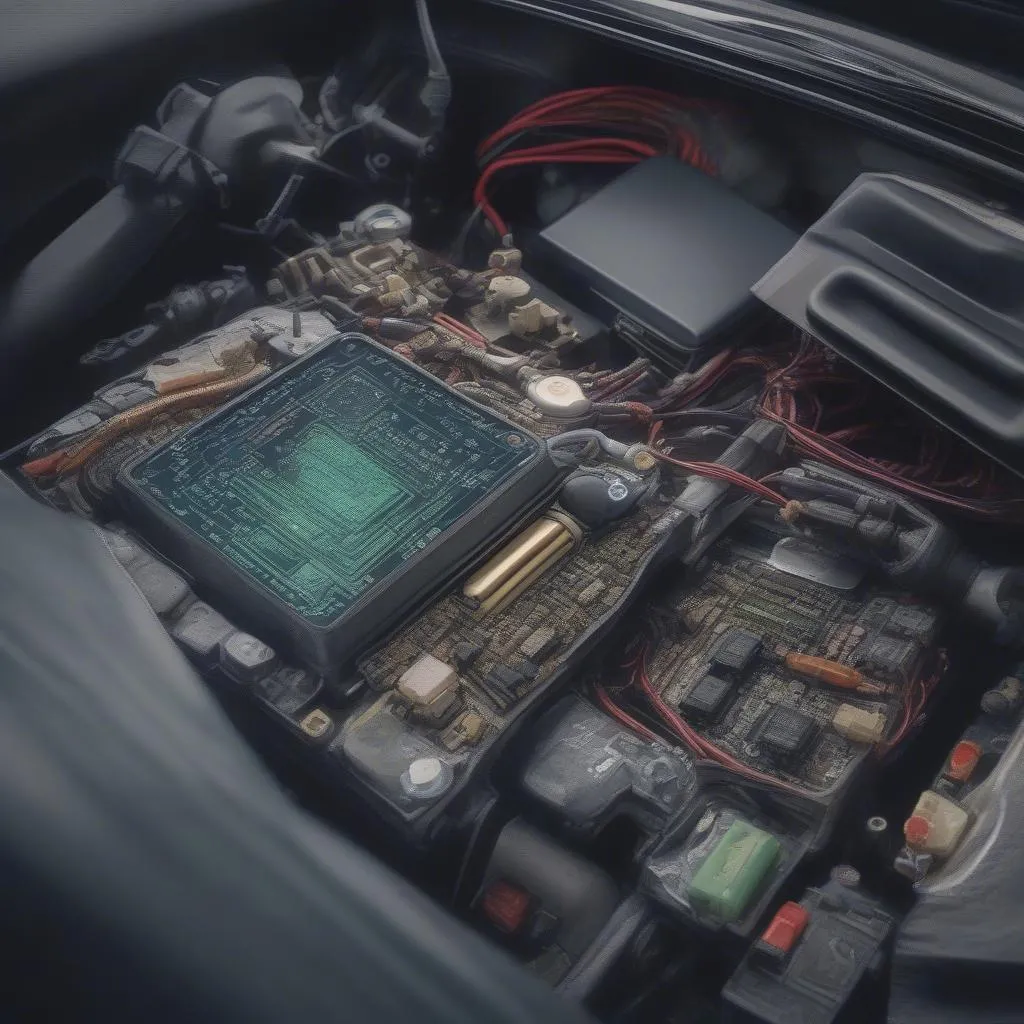Driving your Audi down the road and suddenly you see it—the dreaded brake warning light. To make matters worse, you hear three beeps coming from the dashboard. This situation can be unsettling, but understanding the potential causes and solutions can save you time, money, and stress. This article will guide you through the possible reasons behind an Audi brake warning light accompanied by three beeps and provide potential solutions.
Decoding Your Audi’s Warning System
Your Audi is equipped with a sophisticated system designed to keep you safe. When the brake warning light illuminates and three beeps sound, it’s your car’s way of communicating a problem within the braking system. It’s crucial not to ignore this warning.
Common Causes of the Audi Brake Warning Light 3 Beeps
Several factors can trigger the brake warning light and three beeps in your Audi. Here are some of the most common culprits:
- Worn Brake Pads: This is the most common culprit. As your brake pads wear down, a sensor sends a signal to your dashboard, triggering the warning light and beeps.
- Low Brake Fluid Level: Brake fluid is essential for your braking system to function correctly. A leak or low fluid level can trigger the warning, indicating the need for immediate attention.
- Faulty Brake Sensor: Like any other electronic component, your brake pad sensors can malfunction. A faulty sensor may send a false signal, triggering the warning light even if your brake pads are in good condition.
- Issues with the ABS System: The Anti-lock Braking System (ABS) plays a critical role in preventing wheel lockup during braking. Problems with the ABS module, wheel speed sensors, or wiring can also trigger the brake warning light and beeps.
- Parking Brake Engaged: While seemingly obvious, sometimes the simplest explanation is the right one. Make sure your parking brake is fully disengaged.
Troubleshooting the Issue: A Step-by-Step Guide
Before heading to the mechanic, there are a few things you can check yourself:
- Check Your Parking Brake: As mentioned earlier, ensure your parking brake is fully disengaged. It’s easy to overlook.
- Inspect Your Brake Fluid: Locate your brake fluid reservoir under the hood (consult your owner’s manual for its location). The reservoir should have a “Min” and “Max” marking. If the fluid level is below the minimum, add the recommended brake fluid (DOT 3 or DOT 4, typically).
- Visually Inspect Your Brake Pads: If possible, take a look at your brake pads through the spaces between the wheel spokes. If you see less than 1/4 inch of brake pad material, they are likely worn and need replacement.
When to Seek Professional Help
If the brake warning light persists after checking the above or you are not comfortable performing these checks yourself, it’s crucial to seek professional help.
“Ignoring a brake warning light, especially when accompanied by audible alerts, is incredibly risky,” says master mechanic Jake Carter. “Addressing brake issues promptly can prevent potentially dangerous situations on the road.”
 Mechanic Inspecting Audi Brakes
Mechanic Inspecting Audi Brakes
Remote Diagnostics and Software Solutions: The Future of Car Repair
In today’s technologically advanced world, remote diagnostics and software solutions are revolutionizing car repair, including addressing brake system issues.
Imagine this: you contact your Audi dealership or a specialized remote diagnostics service. They connect to your vehicle remotely, run diagnostics, pinpoint the problem, and, in some cases, even upload software updates or fixes wirelessly. This technology saves you valuable time and can potentially reduce repair costs.
“Remote diagnostics and software solutions are changing the landscape of automotive repair,” says Sarah Thompson, a leading automotive technology expert. “These advancements offer faster, more efficient solutions for car owners, especially for software-related issues.”
Addressing the Audi Brake Warning Light 3 Beeps: Your Safety is Paramount
Remember, the brake warning light and beeps are serious warnings. Ignoring them could lead to more costly repairs down the line and, more importantly, compromise your safety and the safety of others on the road.
By understanding the potential causes, knowing what to check, and seeking professional help when needed, you can ensure your Audi’s braking system remains in top condition, providing you with peace of mind every time you get behind the wheel.
FAQs
Q: Can I still drive my Audi with the brake warning light on?
A: While you might be able to drive for a short distance, it’s highly discouraged. The brake warning light indicates a potential issue with your braking system, and continuing to drive could lead to further damage or even brake failure.
Q: How much does it cost to fix an Audi brake warning light issue?
A: The cost varies widely depending on the specific problem. It could be as simple as a brake fluid top-up or as involved as replacing major brake components.
Q: How often should I get my Audi’s brakes checked?
A: It’s recommended to have your brakes inspected at least once a year or every 12,000 miles, whichever comes first.
Q: Can remote diagnostics fix all brake problems?
A: While remote diagnostics can effectively diagnose many issues, including software-related brake problems, some problems, such as worn brake pads or mechanical failures, will still require hands-on repairs.

